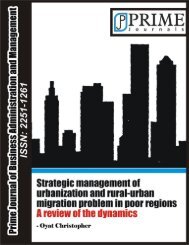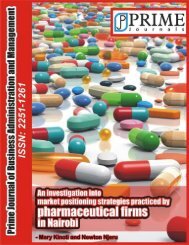<strong>Prime</strong> Journal of Business Administration and Management (BAM)ISSN: 2251-1261. Vol. 2(12), pp. 782-787, December 11 th , 2012www.primejournal.org/BAM© <strong>Prime</strong> <strong>Journals</strong>ReviewCorporate governance theories and their application toboards of directors: A critical literature review1 Letting Nicholas K, 2 Wasike ER, 3 Kinuu David, 3 Murgor Paul, 3 Ongeti Walter, and 4 AosaEvans1 Lecturer, School of Management and Leadership, The Management University of Africa, Nairobi, Kenya.Email: nletting@mua.ac.ke or nletting@gmail.com2 The Director, Nairobi Campus,KabarakUniversity, Nairobi, Kenya3 Doctoral student at the School of Business, University of Nairobi.4 Associate Professor of Strategic Management, School of Business, University of Nairobi and Associate Dean of theSchool.Accepted 12 th November, 2012The ongoing debate on the theories of corporate governance is yet to settle on a specific perspective betweenagency, resource dependence, stakeholders and stewardship theories. While promoters and supporters of eachgroup attempt to rationalize the superiority, and universality of each model in theory, they rarely pay attentionto the long-standing notions, norms and premises underpinning their perspectives which are less credible andvalid in matching the continually changing practice of corporate governance. This paper critically reviews theliterature on corporate governance theories and relates them to the board of directors’ characteristics. In sodoing, it reveals the lack of conventional approaches employed in corporate governance theories. The paperfinally, calls for an integration of all the theories in the field and suggests five areas of future study on corporategovernance in Africa.Key words: Agency theory, corporate governance, board of directors, resource dependence theory, stakeholders’theory, stewardhsip theory.INTRODUCTIONThe current mainstream schools of corporate governancerest their ideas and assumptions on theory of the firmand associated ideologies which were created andconstructed by company law theory and classicaleconomics in the 18th and 19th centuries (Letza et al.,2004). In recent years, the corporate scandals, some ofwhich are still unfolding, involving high incidence ofimproper activities of managers expropriating theresources of a firm at the ultimate expense ofshareholders have prompted the intense re-examinationand scrutiny of some of the existing corporategovernance practices and also considerable interest inempirical research on the effectiveness of variouscorporate governance institutions and mechanisms (Fan,2004).A number of agency problems resulting from theseparation of ownership from control (Berle and Means,1932; Jensen and Meckling, 1976) still prevail in firmsglobally. Nonetheless, agency problems are thenecessary evils of “efficient form of economicorganization” called firms (Fama and Jensen, 1983)where the various resource owners are pooled togetherin order to produce goods or services demanded bycustomers at the lowest cost. Therefore, firms must beconvinced of the importance of grappling with andmanaging corporate governance for their long-termsurvival and growth. This paper attempts to reviewextensively the literature on corporate governance andhow the various corporate governance theories interactwith board of directors charaterisitics to influencecorporate performance.Corporate Governance TheoriesVarious scholars have developed a number of theorieson corporate governance with respect to boards ofdirectors. The scholars have carried out the studies
783 Prim. J. Bus. Admin. Manage.spanning a period of about thirty years. The theoreticalframeworks upon which this review is based are theagency, stakeholder, resource dependence andstewardship theories, which give varied views on thepresence of information asymmetry that the agent (in thiscase, the directors and managers) is likely to pursueinterests that may hurt the principal, or shareholderamong others (Fama and Jensen, 1983). The theoriesform the foundation of the role and effectiveness ofboards of directors in strategic decision-making.The Agency theory is based on the principal-agentframework. Jehnsen and Meckling (1976) viewedorganizations as sets of explicit and implicit contracts withassociated rights. Separation between ownership andcontrol of corporations characterizes the existence ofagency relationship between the board who represent theshareholders and the management who represent theboard and other stakeholders.In the context of corporations and issues of corporatecontrol, agency theory views corporate governancemechanisms especially the board of directors, as beingan essential monitoring device to try to ensure thatproblems that may be brought about by the principalagentrelationships are minimized (Moldoveanu andMartin, 2001; Mallin, 2007). According to Blair (1996),managers as agents must be monitored and institutionalarrangements made to assure checks and balances arein place to avoid abuse of power.Agency theory suggests that boards should consist ofoutside and independent directors. It also proposes thatthe position of the board chairman and chief executiveofficer should be separate (Daily and Dalton, 1992;Balta, 2008). When the separation of those two roles isviolated, mainly when the chairman is under the influenceof the chief executive officer , the agency cost becomesgreat and the firm will suffer in the financial and controlmarket (Dalton et al., 1999; Balta, 2008). AlthoughAgency Theory is the dominant perspective in corporategovernance studies, it has been criticized in recent years(Blair, 1996; Hoskisson et al., 2000; Fan, 2004) becauseof its limited ability to explain sociological andpsychological mechanisms inherent of the principal-agentinteractions (Davis, 1991).The Stakeholder theory takes account of a wider groupof constituents rather than focusing on shareholders(Mallin, 2007). It examines the firm in the context of awider range of implicit and explicit stakeholders havinglegitimate expectations, urgent claims, and/or powerregarding the firm (Jones and Politt, 2002a; Jones andPolitt, 2002b). Stakeholder theorists suggest thatmanagers in organizations have a network ofrelationships to serve that include the suppliers,employees and business partners (Clarkson,1995;Abdullah and Valentine, 2009). This theory focuses onmanagerial or strategic decision-making and suggeststhat the interests of all stakeholders have intrinsic value,and no sets of interests are assumed to dominate others(Clarkson, 1995; Abdullah and Valentine, 2009).According to Stewardship theory, Directors areregarded as the stewards of the company assets and arepre-disposed to act in the best interest of theshareholders (Mallin, 2007). Stewardship theory relatesto the board’s task of providing support and advice tomanagement (Davis, 1991). The stewardship theory hasits roots from psychology and sociology. According toAbdulla and Valentine (2009), stewards are companyexecutives and managers working for the shareholders.The stewards protect and make profits for shareholdersand are satisfied and motivated when organizationalsuccess is attained. Stewardship theory argues that theeffective control held by professional managersempowers them to maximize firm performance andcorporate profits. Regarding the leadership structure,stewards maximise their utility because they achieveorganisational rather than self-serving objectives (Davis,1991; Balta, 2008).Stewardship theorists contend that superior corporateperformance is associated with the majority of insidedirectors because; first, they ensure more effective andefficient decision- making and second, they contribute tomaximise profits for shareholders (Kiel and Nicholson,2003). Consequently, insider-dominated boards arefavoured for their depth of knowledge, access to currentoperating information, technical expertise andcommitment to the firm.Proponents of resource dependency theory haveattempted to explain organisations in terms of theirinterdependence with the environment (Pugh andHickson, 1997, p. 62; Pfeffer and Salancik, 1978). Somescholars have argued that the provision of resourcesenhances organizational functioning, a firm’sperformance and its survival (Daily et al., 2003). Thistheory concentrates on the role of Board of Directors inproviding access to resources needed by the firm(Abdullah and Valentine, 2009). Hillman et al. (2000)contend that resource dependency theory focuses on therole that directors play in providing or securing essentialresources to an organization through their linkages totheir external environment. This theory states thatorganizations are interdependent with their environmentand or other organizations for their survival since they arenot self-dependent (Pugh and Hickson, 1997).The theory thus proposes that corporate board is amechanism for managing external dependencies (Pfefferand Salancik, 1978), reducing environmental uncertainty(Pfeffer, 1972) and environmental interdependency.Resource dependency theory also views outsidedirectors as a critical link to the external environment(Pfeffer and Salancik, 1978). The theory predicts arelationship between the extent of uncertainty anddependence and the composition of the board withrespect to boards’ size and proportion of outside board





![See Full Article [pdf] - prime journals limited](https://img.yumpu.com/49292987/1/190x245/see-full-article-pdf-prime-journals-limited.jpg?quality=85)



![See Full Article [pdf] - Prime Journals](https://img.yumpu.com/44526114/1/190x245/see-full-article-pdf-prime-journals.jpg?quality=85)


![See Full Article [pdf] - prime journals limited](https://img.yumpu.com/42270022/1/190x245/see-full-article-pdf-prime-journals-limited.jpg?quality=85)

![See Full Article [pdf] - Prime Journals](https://img.yumpu.com/41607332/1/190x245/see-full-article-pdf-prime-journals.jpg?quality=85)
![See Full Article [pdf] - Prime Journals](https://img.yumpu.com/41231982/1/190x245/see-full-article-pdf-prime-journals.jpg?quality=85)
